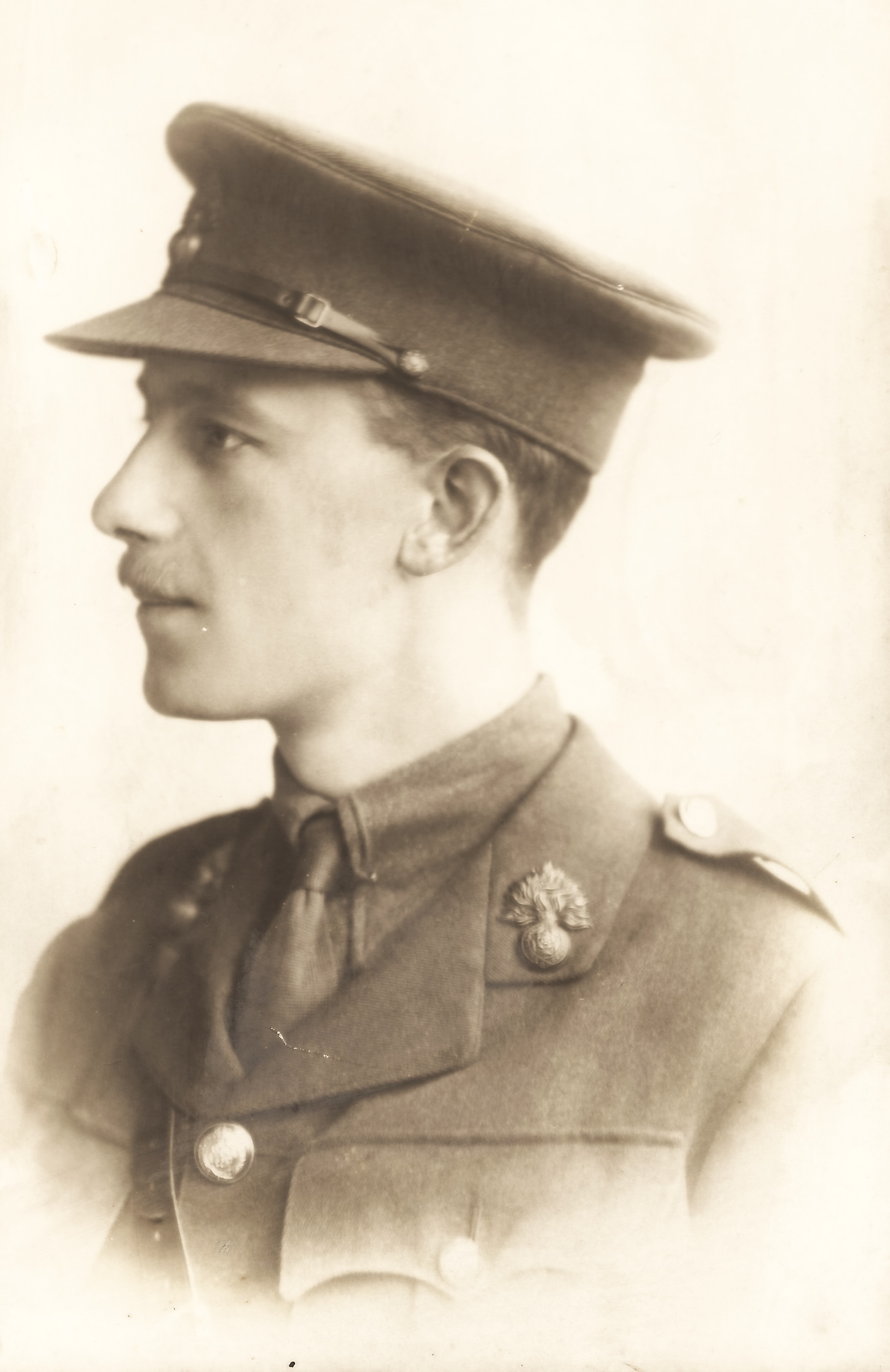2nd Lt
John Benjamin George Elliott
Informatie over geboorte
|
Geboortejaar: 1890 |
|
Geboorteplaats: Stoke Newington, Hackney, Middlesex, Engeland, Verenigd Koninkrijk |
Algemene Informatie
|
Beroep: Postbode |
Informatie legerdienst
|
Land: Engeland, Verenigd Koninkrijk |
|
Strijdmacht: British Expeditionary Force |
|
Rang: Second Lieutenant |
|
Service nummer: / |
|
Dienstneming datum: 25/02/1909 |
|
Dienstneming plaats: London (City), Middlesex, Engeland, Verenigd Koninkrijk |
|
Eenheden: — London Regiment, 1/4th Bn. (Royal Fusiliers) (Laatst gekende eenheid) |
Informatie over overlijden
|
Datum van overlijden: 16/08/1917 |
|
Plaats van overlijden: Clapham Junction, Zonnebeke, België |
|
Doodsoorzaak: Killed in action (K.I.A.) |
|
Leeftijd: 27 |
Gedenkplaats
|
Ypres (Menin Gate) Memorial Paneel: 52D |
Onderscheidingen en medailles 3
|
1914-15 Star Medaille — 02/12/1919 |
|
British War Medal Medaille — 30/05/1921 |
|
Victory Medal Medaille — 30/05/1921 |
Points of interest 3
| #1 | Geboorteplaats | ||
| #2 | Dienstneming plaats | ||
| #3 | Plaats van overlijden (bij benadering) |
Mijn verhaal
John Benjamin George Elliott was born in 1890 and was the only son of Walter and Katherine Alice Elliott, of Hackney, Middlesex. John worked as a Postman and enlisted for the Post Office Rifles, 1/8th Battalion (City of London Regiment) in 1909. He remained a part-time volunteer with the Post Office Rifles, till the outbreak of the war. In March 1915 John arrived in France. Two months later he was promoted to Sergeant. After a year of service on the Western Front, John was discharged, as he suffered from Phthisis or tuberculosis. After convalescing at home, he reenlisted and by the summer of 1917, John served as a 2nd Lieutenant with the 1/4th Battalion London Regiment, part of the 168th (2nd London) Brigade, of the 56th (1st London) Division.
In August 1917 the 56th Division participated in the Battle of Langemarck, a phase of the Battle of Passchendaele. The 53rd Brigade of the 18th Division was to cover the right flank of the Division, but because the 53rd Brigade had been in the line since the 31st of July, the task was handed over to the 1/4th Londons. John’s Battalion moved to their allotted sector at Clapham Junction, along the Menin Road, on 15 August.
After a short rest the men took up their positions. Assembly was completed by 4.20 a.m. German shelling was fairly heavy and a machine-gun from Inverness Copse started targeting the 1/4th Londons. By 4.45 a.m. the Battalion had already suffered 22 casualties. At zero hour, 5.45 a.m. the men moved forward. The 7th Bedfords on the right, designated to take Inverness Copse, were beaten back immediately. The 1/4th Londons were now completely exposed to machine-gun fire from Inverness Copse. Within a few minutes five officers and 40 men were casualties. The advance was resumed, but was finally checked at Jap Avenue. Though posts were established in Jap Avenue and Jargon Drive, no further advance could be made, owing to machine-gun and sniper fire from inverness Copse.
John Benjamin George Elliott was killed in action on 16 August 1917. The 27-year old fell during the attack north of inverness Copse. John has no known grave and is remembered on panel 52D of the Ypres (Menin Gate) Memorial.
In August 1917 the 56th Division participated in the Battle of Langemarck, a phase of the Battle of Passchendaele. The 53rd Brigade of the 18th Division was to cover the right flank of the Division, but because the 53rd Brigade had been in the line since the 31st of July, the task was handed over to the 1/4th Londons. John’s Battalion moved to their allotted sector at Clapham Junction, along the Menin Road, on 15 August.
After a short rest the men took up their positions. Assembly was completed by 4.20 a.m. German shelling was fairly heavy and a machine-gun from Inverness Copse started targeting the 1/4th Londons. By 4.45 a.m. the Battalion had already suffered 22 casualties. At zero hour, 5.45 a.m. the men moved forward. The 7th Bedfords on the right, designated to take Inverness Copse, were beaten back immediately. The 1/4th Londons were now completely exposed to machine-gun fire from Inverness Copse. Within a few minutes five officers and 40 men were casualties. The advance was resumed, but was finally checked at Jap Avenue. Though posts were established in Jap Avenue and Jargon Drive, no further advance could be made, owing to machine-gun and sniper fire from inverness Copse.
John Benjamin George Elliott was killed in action on 16 August 1917. The 27-year old fell during the attack north of inverness Copse. John has no known grave and is remembered on panel 52D of the Ypres (Menin Gate) Memorial.
Bronnen 3
|
1/4 Battalion London Regiment (City of London). (The National Archives, KEW (TNA), WO 95/2954/1). https://discovery.nationalarchives.gov.uk/details/r/C14303 Verdere verwijzing |
|
Grimwade C., The War History of the 4th Battalion the London Regiment (Royal Fusiliers) 1914-1919, (London, Headquarters of the 4th London Regiment, 1922), pg. 294-305. Gebruikte bronnen |
|
McCarthy C., Passchendaele. The Day-by-Day Account, (London, Uniform, 2018), pg. 50-53. Gebruikte bronnen |
Meer informatie 3
|
Commonwealth War Graves Commission Database https://www.cwgc.org/find-records/find-war-dead/casualty-details/1611425 |
|
Namenlijst (In Flanders Fields Museum) https://namenlijst.org/publicsearch/#/person/_id=c2459dd0-4520-466a-a0fc-3f1fbf990fc2 |
|
Lives of the First World War (Imperial War Museum) https://livesofthefirstworldwar.iwm.org.uk/lifestory/2444571 |
